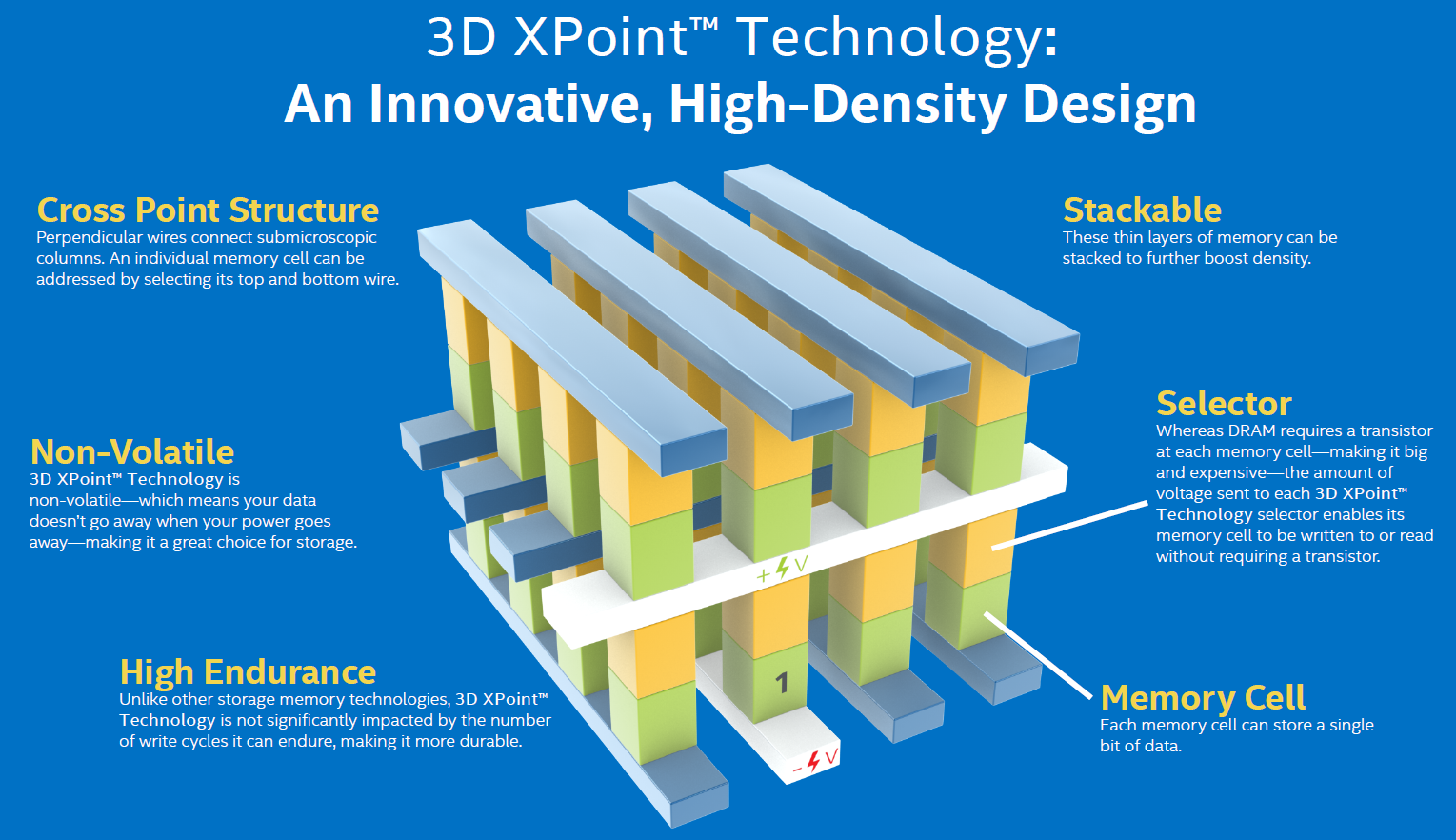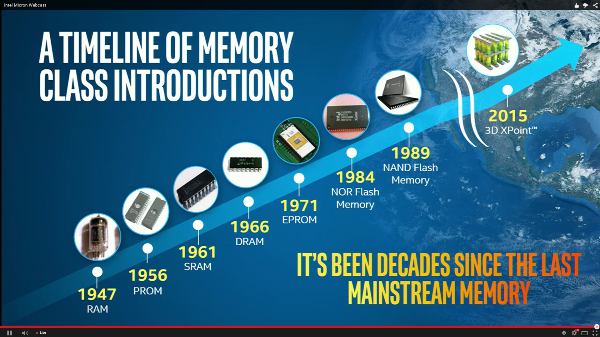Intel Kills Optane Memory Business, Pays $559 Million Inventory Write-Off
3D XPoint at the last crossroad.
Update 08/02/2022 12:30am PT: Intel reached out to clarify that it would bring the next-gen Crow Pass Optane memory DIMMs to market and will use its existing inventory to fulfill orders. This wasn't clear from Intel's previous statement because this is technically a future product. We have clarified that point in the below text.
Original Article:
Intel's Q2 2022 earnings report today was uncharacteristically disappointing, but it also hid a new announcement: Intel is winding down its Optane business entirely. During the earnings call, Intel CEO Pat Gelsinger clarified the vaguely worded announcement in the earnings documents, confirming that Intel will wind down its Optane business. The move incurs a $559 million inventory impairment/write-off. We reached out to Intel for comment on the matter:
"We continue to rationalize our portfolio in support of our IDM 2.0 strategy. This includes evaluating divesting businesses that are either not sufficiently profitable or not core to our strategic objectives. After careful consideration, Intel plans to cease future product development within its Optane business. We are committed to supporting Optane customers through the transition."— Intel's spokesperson to Tom's Hardware. [See additional commentary below for more clarity]
Gelsinger said this marks the sixth non-core business Intel has sold since his arrival, including the recent sale of its drone business to Elon Musk's brother along with the sale of the SSD storage unit to SK hynix, generating $1.5 billion for investment in areas that are core to Intel's business.

Intel used Optane memory to create both storage and memory products, and it has long been rumored to be on the chopping block. At its debut in 2015, Intel and partner Micron touted the underlying tech, 3D XPoint, as delivering 1000x the performance and 1000x the endurance of NAND storage, and 10x the density of DRAM.
Intel had already stopped producing its Optane storage products for client PCs, which makes sense as it is at the beginning of a multi-year journey to sell its NAND business to SK hynix. However, Intel originally retained its memory business for the data center, including its persistent memory DIMMs that can function as an adjunct to main memory — a capability only Intel offered. Now those products will also not see any future generations after the next-gen Crow Pass modules that will arrive with the Sapphire Rapids processors.
Gelsinger cited an industry shift to CXL-based architectures as a reason for winding down the Optane business, mirroring Intel's ex-partner Micron's sentiments when it exited the business last year. Micron was the sole high-volume fabricator of 3D XPoint, the memory Intel uses to make Optane, and the company later sold its 3D XPoint fab to Texas Instruments, leaving Intel with no production facilities of its own.
Industry watchers reported that Intel was serving existing Optane customers from its inventory that it amassed from Micron before the fab was closed, but that it wasn't actively fabricating the memory. Intel reportedly had several years of inventory on hand, perhaps helping explain the magnitude of the $559 million write-off.
Interestingly, we saw the initial tests of Intel's next-gen DDR5 Optane memory modules, codenamed Crow's Pass, emerge just last week. These DDR5 modules are planned to debut with Intel's oft-delayed Sapphire Rapids chips later this year.
Intel's David Tuhy, Vice President and General Manager of the Intel Optane Group, reached out to clarify that the company will still bring the Crow Pass modules to market and that the company will use its existing inventory to fulfill orders. Intel will also continue to sell its other existing Optane data center products and predicts that, based on its current forecasts, it has several years' worth of inventory. However, the company will not develop any further generations, instead now taking a $559 inventory write-off.
Get Tom's Hardware's best news and in-depth reviews, straight to your inbox.

Paul Alcorn is the Editor-in-Chief for Tom's Hardware US. He also writes news and reviews on CPUs, storage, and enterprise hardware.
-
cirdecus This is a shame. Optane runs client apps and games far better than anything today and at extreme reliability. I'm using the 1.5TB drive for steam games and windows apps and i love it. That being said, I know they're looking to focus on their chip business and as NAND improves, the cost for the technology just can't keep up. Great innovation though.Reply -
maestro0428 Damn right its a shame. Optane drives are the fastest on the planet and will be for some time. They also last for ever (tons of writes) and noone can match it. I have four in my workstation and love em. Mine (900p) arent the fastest at sequential reads and writes but still dominate benches in everyplace that actually matters.Reply -
jeremyj_83 Reply
This was Optane memory and not Optane SSD.maestro0428 said:Damn right its a shame. Optane drives are the fastest on the planet and will be for some time. They also last for ever (tons of writes) and noone can match it. I have four in my workstation and love em. Mine (900p) arent the fastest at sequential reads and writes but still dominate benches in everyplace that actually matters. -
LikeClockwork64 Some poor IT guy is going to get fired because its going to take a day instead of an hour to troubleshoot someone's businessReply -
we_are_theBorg Shouldn't that subtitle be:Reply
"3D XPoint at the last Xroad."🤔
But seriously, it's a shame. I only ever used it seriously in one system but it was incredibly useful when you really needed that memory density, or an intermediate caching layer with extremely durable writes. It's failure kinda psychologically entrenches NAND just that much deeper and disincentivises future productization of any competing or creative high performance storage technologies.
XPoint, you will be missed (a little bit, by a handful of hardcore nerds) 🥀 -
escksu Oh, been a long time. Optane is not bad but its simply way too expensive. It ended up as a product which is neither here nor there.Reply
Unlike Optane, NAND is making leaps and bounds in terms of progress. This is mainly due to a very competitive market and massive demand for NAND. -
2Be_or_Not2Be Replyjeremyj_83 said:This was Optane memory and not Optane SSD.
I feel the irony in how Intel wants now to get back more local manufacturing/fabrication, but they let a local one of their own creation go previously. It's still a shame to me that they left Optane storage first, which was its best performer - more so than Optane memory. Optane was great for virtual hosts & database servers in the enterprise, but they couldn't bring the price down to make it become profitable to everyone. Between them and Micron, they would have had the highest performing standard for storage, not only for servers, but even for client PCs. Also, they would have dominated it as being the sole providers of the storage at first, before they started licensing it out more. Intel was making billions; they should have kept it longer, even while they were losing on it. The long-term potential for the future could have made that the loss back. Instead, NAND still dominates, and we're faced with lower stuff like QLC & PLC. Ugh...
Oh well... such is life. -
Kamen Rider Blade Intel making bone head moves again.Reply
They should license the Optane technology to ALL the competing memory manufacturers and let them innovate on it.
Just like Intel contributing ThunderBolt Interface to USB IF.
Intel trying to make this "Proprietary", kills off very good technology by being too expensive to sustain or innovate on.
Damn, such good technology going down the drain because of mismanagement for the top getting too greedy. -
slash3 Replyjeremyj_83 said:This was Optane memory and not Optane SSD.
Ryan Smith over at AnandTech has since confirmed with Intel that it is in fact Optane in its entirety that is being discontinued.
https://www.anandtech.com/show/17515/intel-to-wind-down-optane-memory-business
"Update: 6:40pm ET
Following our request, Intel has sent out a short statement on the Optane wind-down. While not offering much in the way of further details on Intel's exit, it does confirm that Intel is indeed exiting the entire Optane business.
We continue to rationalize our portfolio in support of our IDM 2.0 strategy. This includes evaluating divesting businesses that are either not sufficiently profitable or not core to our strategic objectives. After careful consideration, Intel plans to cease future product development within its Optane business. We are committed to supporting Optane customers through the transition."

